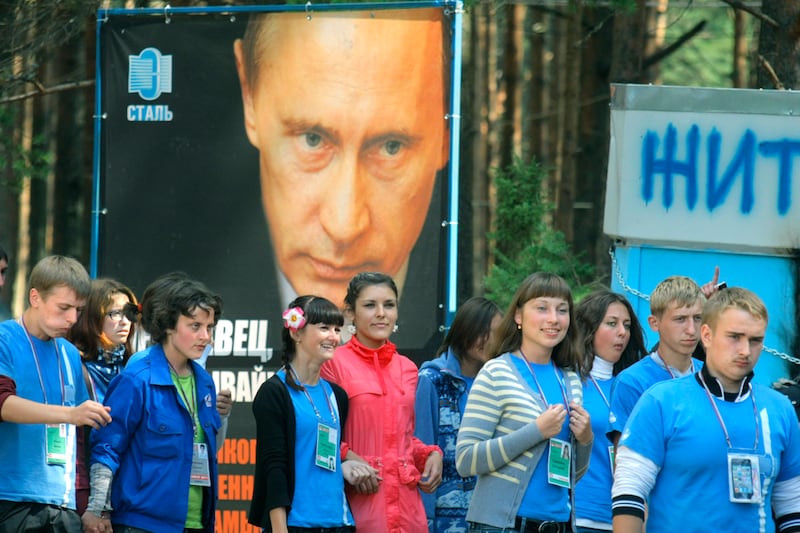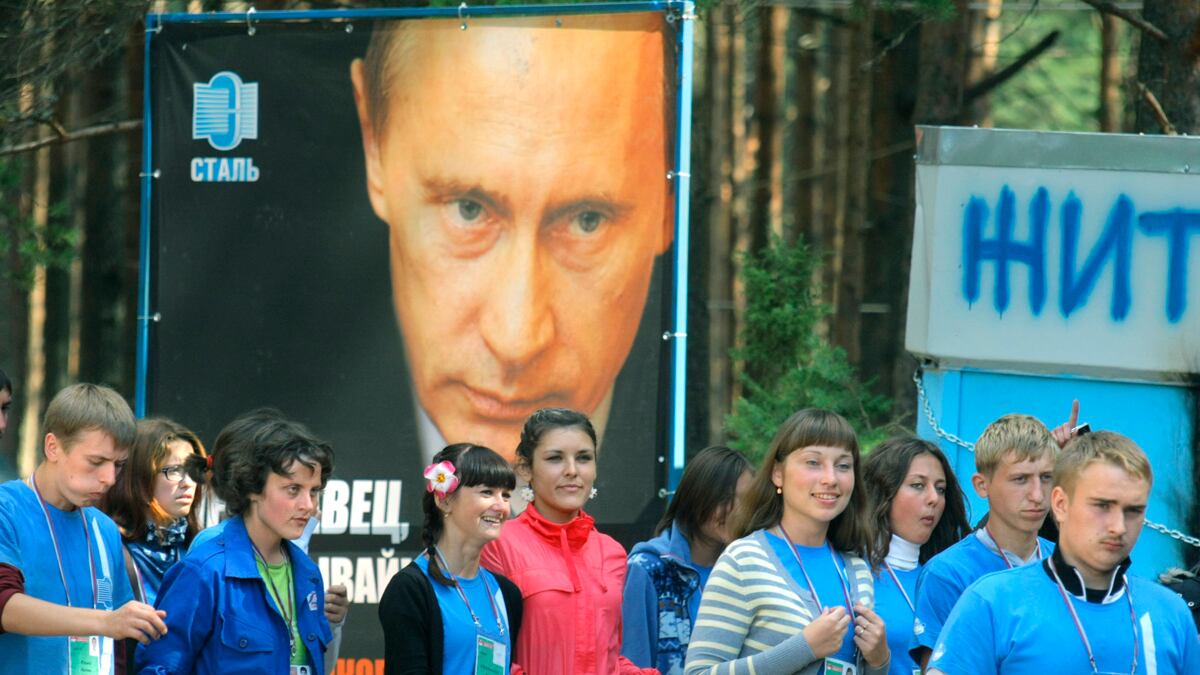A gentle July breeze was playing on the shores of Russia’s Seliger lake, blowing away the mosquitoes and cooling hundreds of campers who sat in tight circles on wooden platforms. On stage, speakers from the United States, Asia, and Europe lectured the youth on world politics, social development, and management skills. “Stay happy, open, and friendly,” advised Deb Sofield, a visiting Harvard professor. In the background, big flat-screen televisions mounted on pine trees loomed over the kids’ tents, broadcasting CNN and Russia Today, the state television station.
Welcome to the All Russia Youth Innovative Forum “Seliger-2011,” a Kremlin-sponsored summer camp set in picturesque green woods about 200 miles north of Moscow. The gathering—now in its seventh year—hosted a whopping 20,000 participants, including 900 students from foreign countries. Like the Labor Party youth camp on Norway’s Utoya Island targeted by Anders Behring Breivik in his July 22 murder spree, Seliger is a place where politically minded kids can gather to debate their ideas for the future. On Utoya, extremism tragically intruded from the outside to disrupt these ideas. But at Seliger, extremism has often bubbled up among the campers themselves, many of whom belong to Russia’s pro-Kremlin youth nationalist movements.
Take the closing day of last year’s Seliger Forum, when a youth group called Stal—Russian for “steel,” with obvious echoes to the name “Stalin”—set up a thicket of wooden stakes topped with puppet heads representing Hillary Clinton, Condoleezza Rice, judges of the European Court of Human Rights, members of Estonia’s parliament, and a number of Russian human-rights activists. The puppets were adorned with military hats bearing Nazi swastikas; a banner with big red letters exclaimed, “We’re not glad to see you here.” Though other campers criticized the installation and the stakes didn’t stay up for long, the incident tarnished Seliger’s reputation both domestically and internationally. Another youth group that regularly participates at Seliger, the pro-Putin firebrand Nashi movement, has also made a name for itself by blocking trucks delivering goods to Estonia to protest “Estonian state fascism” and by harassing the former British ambassador to Russia, Anthony Brenton, at his public meetings in Moscow.
As a result of these incidents, a number of Seliger sponsors backed out this year, including German auto maker Mercedes-Benz and the Italian notebook company Moleskine. The chief editor of the popular radio program Echo of Moscow, Alexei Venediktov, also claimed that he rejected an offer to speak at Seliger, since the management had never apologized for the mock heads on the pikes. “I respect myself too much to take part in that garbage,” Venediktov said.

In an effort to improve Seliger’s image, the Kremlin hired a former Moscow State political science professor, Mikhail Mamonov, to travel to U.S. universities such as Harvard, Stanford, and Georgetown to woo American youth to join the summer camp. Mamonov says that he faced “vast criticism” on the campuses over the conviction of oligarch Mikhail Khodorkovsky and “Putin and Medvedev’s bloody regime.” Nevertheless, Mamonov was able to drum up 32 American participants and the Seliger organizers took care to present a message of “reset” with the United States. This year, banners blared the obligatory quotes from Prime Minister Vladimir Putin and President Dmitri Medvedev, but also included Michael Jackson lyrics. On the Fourth of July, a barbeque was held with Coca-Cola and grilled sausages and partygoers sang the American national anthem. “We welcome the reset in U.S.-Russia relationships as long as it is mutual,” said Nikita Borovikov, the leader of a forum hosted by the Nashi youth group.
Lecturers also reported being impressed by the tone of this year’s conference. Rod Martin, a U.S. Republican Party member and former Paypal.com advisor, said he was thrilled by how well read the kids were. “We discussed George Orwell’s 1984, as a part of my lecture on how advancing technology will make you richer and freer. Most of the kids had read the book.” A speaker on risk management, Gaurav Singhal, said he was delighted to meet “potential partners” for the environmental NGO he founded in India. Neither Martin nor Singhal said they felt any sense of an anti-Western political agenda.
Unlike the speakers, students admitted they did. One of the U.S. campers, 22-year-old Henderson Cooper, said he was briefed by U.S. officials before his visit to Seliger. “Senators warned us to be careful, as some Russian participants had been required to write essays on books about [how] America’s destroying the world.” Cooper remained undaunted, and even said he wanted to find and read the books in question “to understand the opponents’ arguments better.”
In addition to participating in Seliger, Cooper was one of 15 American “Kremlin fellows” who had the chance to meet with Medvedev and chief Kremlin ideologist and Nashi founder Vladislav Surkov. Cooper took the chance to pitch Surkov on his plan to create an NGO to launch academic and entrepreneurial exchange programs for Americans and Russians between the ages of 18 and 30. Cooper reported liking Surkov: “We are both from small towns; Mr. Surkov wrote me a letter after our meeting, inspiring my project.”
Some Russian participants have also shown more enthusiasm for relations with the West than in years past. One of the Seliger Forum’s managers and Russia’s youngest parliament member, 25-year-old Robert Schlegal, used to be a well-known anti-American activist. Three years ago, Schlegal—sometimes called Putin’s favorite protégé—led a crowd of 12,000 Nashi members to the American embassy in Moscow and played a film in which a cartoon George W. Bush claimed, “I control the world’s oil, economy, wars, culture, science, and information.” While Schlegal still refers to the United States as “the most aggressively dominating empire,” he now says Nashi’s anti-Western attacks are “the old agenda.” Last year, Schlegal and three of his best friends drove across the U.S. from New York to Los Angeles and he says he now dreams about taking a year off from the ruling United Russia Party to study at Harvard. “So in the future, say in six years, when I lead my own party into the Russian Parliament, I would have friends with[in] the young American elite.”
Still, few in Russia’s civil society feel persuaded that the Seliger Forum and the pro-Kremlin youth movements are sincere about a reset. Moscow human-rights defender Lyudmila Alexeyeva, whose likeness was on one of the heads on pikes in the Stal installation, said she has no doubts that Nashi or Stal will hang some ugly banners to make the real point of the gathering clear. “This will happen once the foreign guests go home,” she said. Indeed, in the closing days of Seliger, Putin himself visited to address Russia’s future elite about how Americans “liv[e] like parasites off their monopoly of the dollar.” Putin’s bullying performance muddled the message of reset with the West and gave strong hopes to Nashi commissars that if the prime minister returns to the Kremlin in next March’s elections, he will bring such anti-American rhetoric with him.





